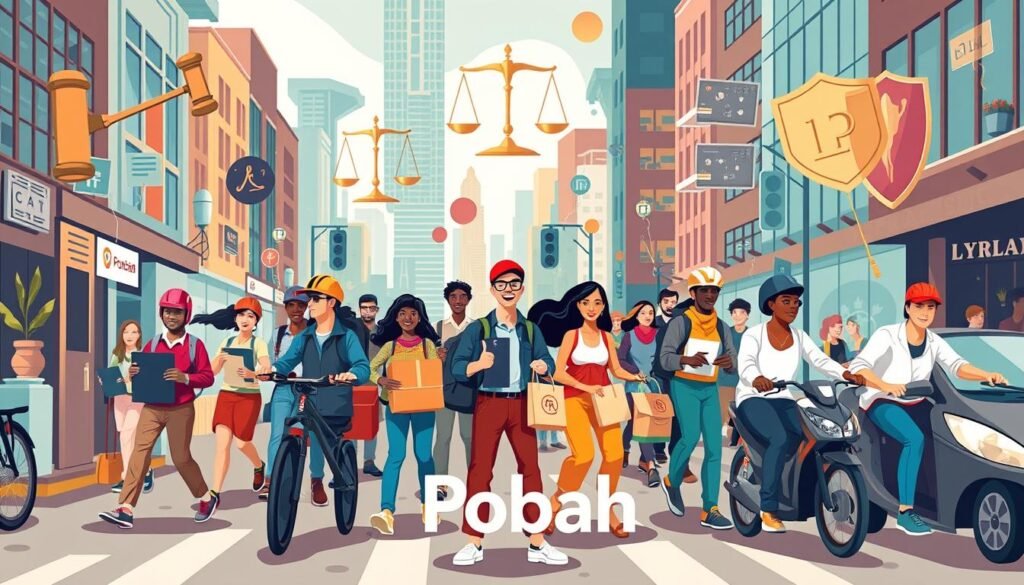The gig economy has changed how we work, giving us more freedom and control. But, it also brings legal hurdles that you need to know about. Issues like worker misclassification, poor labor protections, and unclear rights are common.
It’s not just about knowing these problems. It’s also about finding ways to overcome them. In this article, we’ll look at the gig economy in the U.S. and share tips to protect your rights and avoid legal traps.
Key Takeaways
- The gig economy offers flexibility but comes with legal uncertainties.
- Misclassification and inadequate protections are prevalent legal issues.
- Understanding your rights is essential for success in gig work.
- Effective strategies and solutions can mitigate legal risks.
- Knowledge of local laws is crucial for compliance.
Understanding the Gig Economy
The gig economy is a big change in how we work. It’s all about short-term, flexible jobs thanks to digital platforms. Uber, Lyft, TaskRabbit, and Upwork are big names here. They let people work as freelancers.
This way of working is all about tasks, not long-term jobs. People in the gig economy can work on many projects at once. This gives them more freedom and control over their time. It’s great for those who want extra money or different work options.
But, this system has its downsides. Gig workers might not know how much they’ll make or get benefits like regular jobs. It’s important to understand the gig economy to know the legal issues it brings.
| Aspect | Gig Economy | Traditional Employment |
|---|---|---|
| Employment Type | Task-based, flexible | Long-term contracts |
| Worker Autonomy | High | Limited |
| Income Stability | Variable | Consistent |
| Benefits | Often lacking | Health insurance, retirement plans |
| Examples of Work | Rideshare driving, freelance writing | Full-time office positions |
Knowing these differences helps you deal with the gig economy’s legal issues. As things change, it’s key to keep up with the impact of freelance work and the on-demand labor market.
The Rise of Gig Workers in the United States
The job market is changing fast, especially with more gig workers in the U.S. About 36% of U.S. workers are now gig workers. This shows a big change in how people find jobs and make money.
Several factors contribute to this rise, including:
- Technological advancements: New apps and digital platforms make it simple for people to offer services and find clients.
- Demand for flexibility: Many want jobs that fit their personal lives and goals.
- Economic necessity: Some do gig work to make extra money, because the regular job market is unpredictable.
These gig economy statistics show a big change in how we work. Knowing about these changes can help you succeed in the gig economy.

Overview of Gig Economy Legal Issues
The gig economy brings many legal challenges to workers across the United States. A big issue is worker classification. Many gig workers are seen as independent contractors, not employees. This means they miss out on important benefits and protections.
Gig workers often lack health insurance, unemployment benefits, and workers’ compensation. This is because laws don’t fully cover gig work. Without clear federal rules, there’s a lot of confusion. This leads to many court battles over worker rights.
The laws around the gig economy are still changing. As the debate on worker classification goes on, we need better labor laws. Fixing these issues could help gig workers get fair treatment and benefits.
Addressing Legal Challenges in the Gig Economy: Key Considerations and Solutions
The gig economy brings many legal challenges that need quick action. It’s important for gig workers to know how to handle these issues. One big thing is fighting for clear rules on who is considered a worker.
Being unclear can lead to workers missing out on important benefits and protections. Gig companies also have a big role in following labor laws. They should make sure work is fair and follow rules to protect workers.
Talking openly between gig workers and companies can help create a better balance. To solve these problems, we might need new laws that keep up with gig work’s changes. Giving freelancers the right to bargain for better pay and conditions is also crucial.

Legal Rights for Gig Workers
The legal world for gig workers is complex. It offers different levels of protection based on how you’re classified. Knowing if you’re an independent contractor or an employee is key. It helps protect you in disputes and ensures your voice is heard.
Independent Contractor vs. Employee Status
Being an independent contractor means more freedom but less benefits. You might not get health insurance or paid leave. Employees, however, get more protections like overtime pay and anti-discrimination laws.
Misclassifying workers can hurt employers a lot. It’s important to know where you stand.
Freelance Legal Protections
Freelancers face special challenges, like getting paid on time. Legal protections for freelancers vary by state. They cover things like payment timelines and how to solve disputes.
Knowing these protections empowers you. It helps you deal with problems before they start.

| Aspect | Independent Contractor | Employee |
|---|---|---|
| Control Over Work | You set your schedule and methods. | Your employer dictates your work schedule and methods. |
| Benefits | Not eligible for benefits like health insurance. | Eligible for benefits including paid leave. |
| Tax Obligations | You handle your taxes and payments. | Your employer withholds taxes from your paycheck. |
| Job Security | Contracts define the scope; less job security. | Typically have greater job security. |
| Legal Protections | Limited protections under labor laws. | Comprehensive protections under labor laws. |
Knowing your rights as a gig worker is crucial. It affects your work life a lot. Stay informed about your protections to keep your interests safe.
Navigating Gig Economy Laws
It’s key to know the gig economy rules to do well. Laws differ at the federal and state levels. This makes it tough for those in freelance, contract, or part-time jobs. Federal laws, like the Fair Labor Standards Act (FLSA), set rules on pay, hours, and more.
Every state has its own rules, making it harder to follow the law. Knowing your local laws is important. Your state might offer extra protections like a minimum wage, healthcare, or unemployment benefits.

- Get advice from a legal expert in employment law.
- Go to workshops or seminars about your industry’s rules.
- Keep up with state and federal updates on gig work.
- Connect with other gig workers to share tips and stories.
Being proactive in learning about gig economy laws protects your rights and money. Knowing the laws well helps you succeed in this changing job world.
| Aspect | Federal Regulations | State Regulations |
|---|---|---|
| Minimum Wage | Applies to all covered workers | Varies by state; can exceed federal rates |
| Overtime Pay | Applicable to certain employees | State laws may include additional criteria |
| Benefits | No mandated federal benefits | Some states may offer health and unemployment benefits |
| Worker Classification | FLSA sets definitions | Some states have their own criteria (e.g., AB5 in California) |
Being aware and working hard to understand gig economy laws helps you work with confidence in this changing world.
Compliance Challenges in the Gig Economy
The gig economy offers flexibility and opportunities. Yet, it presents significant compliance challenges. You must navigate a complex landscape of local regulations that can vary greatly between jurisdictions. Understanding the nuances of these regulations is crucial for avoiding common compliance pitfalls and ensuring a sustainable working arrangement.
Understanding Local Regulations
Each state and city may implement different laws governing gig work. This inconsistency creates a challenge for gig workers, who must be vigilant about compliance. Key areas to explore include:
- Tax Requirements: Understanding local tax laws can prevent unexpected liabilities.
- Licensing: Certain services may require specific permits or licenses which vary by location.
- Worker Benefits: Knowing what benefits apply in your jurisdiction is essential to avoid non-compliance.
Common Compliance Pitfalls
Many gig workers fall into compliance pitfalls due to a lack of knowledge or resources. Common issues often include:
- Misclassifying your employment status, leading to tax and legal complications.
- Neglecting necessary licenses or permits, which can result in fines or penalties.
- Failing to account for local regulations regarding workplace safety and labor laws.

By identifying these compliance challenges in the gig economy, you can take proactive steps to equip yourself for success. Understanding local regulations and avoiding common compliance pitfalls can ultimately safeguard your gig work experience, offering you more stability and peace of mind.
Solutions for Gig Economy Legal Challenges
Working in the gig economy comes with legal hurdles for freelancers. To tackle these, a broad strategy is needed. This includes supporting gig workers and making sure contracts are clear.
Advocacy and Legal Resources
Supporting gig workers through advocacy is key. Strong groups offer vital resources and education. They help you understand your rights and how to deal with laws.
These resources include:
- Workshops on legal rights and responsibilities
- Online forums for sharing experiences and advice
- Legal hotlines for immediate assistance
Being part of these groups raises awareness and fights for fair treatment in the gig economy.
Creating Clear Contracts
Another important step is to make clear contracts. Clear contracts avoid disputes and protect your rights. Key parts to include are:
| Contract Element | Description |
|---|---|
| Scope of Work | Clearly define the tasks and deliverables expected from both parties. |
| Payment Terms | Specify payment rates, schedules, and methods. |
| Timeline | Outline critical deadlines and milestones related to project deliverables. |
| Legal Protections | Include clauses that address dispute resolution and intellectual property rights. |
By focusing on these areas, you strengthen your gig economy position. This ensures you follow the law and are protected from unexpected issues.
Conclusion
The gig economy brings many legal challenges that need to be faced to help freelancers thrive. It’s important to understand the relationship between gig workers and their clients. You’ve seen how worker classification impacts rights and the need for clear contracts.
To tackle these issues, we need everyone’s help. Advocates, lawmakers, and industry leaders must work together. The rise of gig work shows we need new laws to protect everyone involved.
The future of gig work depends on solving these legal problems. It’s not just about fairness; it’s crucial for the economy and society. By staying open to change, we can build a better future for all in this new work world.
FAQ
What are the main legal challenges faced by gig workers?
Gig workers often face issues like being wrongly labeled as independent contractors. This can limit their access to benefits and protections. Also, the lack of strong labor laws for the gig economy creates uncertainty for freelancers.
How can gig workers ensure they understand their legal rights?
To know your rights, learn the difference between being an independent contractor and an employee. Look into state laws and join groups that help gig workers. These can offer legal advice and education.
What steps can be taken to address compliance challenges in the gig economy?
To tackle compliance issues, gig workers should keep up with local laws, taxes, and licenses. Having clear contracts and accurate records can also prevent common problems.
Are there any protections available for gig workers?
Yes, gig workers might have some legal protections, depending on where they work and their job type. These can include rights to fair pay, timely payments, and equal treatment. But, it’s important to check local laws for specific rights.
How can gig companies improve compliance and protections for gig workers?
Gig companies can do better by offering training on labor laws. They should also make it easy for workers to report issues and update contracts to protect freelancers.
What are some effective solutions for gig economy legal challenges?
Good solutions include pushing for clear laws about gig work, improving benefits, and supporting collective bargaining for freelancers. Legal resources can also help workers understand their rights and follow the law.



